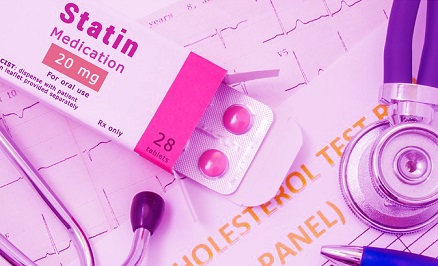Nikhil Prasad Fact checked by:Thailand Medical News Team Oct 26, 2024 1 year, 1 month, 3 weeks, 4 days, 20 hours, 55 minutes ago
Medical News: Researchers at the Lithuanian University of Health Sciences have investigated whether widely-used cardiovascular medications, particularly statins and renin-angiotensin-aldosterone system inhibitors (RAASI), might reduce inflammation in COVID-19 patients. The study examines the effect of these medications on interleukin-6 (IL-6) levels, a cytokine tied to heightened inflammation and worse COVID-19 outcomes. This
Medical News report reviews the findings and suggests that these common drugs could play an important role in managing COVID-19’s inflammatory effects, especially in patients with cardiovascular conditions.
 Statins and RAASI Drugs Linked to Lower IL-6 Levels in COVID-19 Patients
Statins and RAASI Drugs Linked to Lower IL-6 Levels in COVID-19 Patients
The Lithuanian study brings attention to the anti-inflammatory properties of statins and RAASI, known for treating high cholesterol and blood pressure, respectively. Both medications have demonstrated benefits beyond their primary uses, showing anti-inflammatory effects that may make them beneficial for COVID-19 patients. According to the study, patients with cardiovascular disease who were taking statins or RAASI were found to have lower IL-6 levels. By reducing IL-6, these drugs could help manage immune responses and potentially improve COVID-19 patient outcomes.
Key Insights and Methods in the Study
The study included 106 hospitalized COVID-19 patients, most of whom had pre-existing cardiovascular conditions. These patients were classified by disease severity and evaluated for various cytokine levels, focusing particularly on IL-6 as it has been linked to serious COVID-19 complications. Other demographic and clinical details were also assessed to provide a broader understanding of each patient's health profile.
The researchers categorized the patients into groups, considering the presence of chronic cardiovascular disease and whether they were taking statins or RAASI. This approach helped the researchers gauge the impact of these medications on inflammation levels in patients with COVID-19. Notably, IL-6, which often contributes to severe inflammatory responses, was found to be lower in those taking these medications. This reduction in IL-6 levels was statistically significant, suggesting that the medications had a substantial effect on immune response regulation.
Findings on Statins, RAASI, and IL-6 Levels
In patients with cardiovascular conditions who were taking statins, the study observed that their median IL-6 levels were significantly lower compared to patients without these medications. Specifically, patients on statins had median IL-6 levels of approximately 21 pg/mL, while those without cardiovascular disease showed levels around 44 pg/mL. This finding suggests that statins may reduce inflammation, which is valuable in COVID-19, where excessive immune responses can worsen outcomes.
The study also found that RAASI medications, widely used to manage high blood pressure and heart issues, showed similar effects on IL-6 levels. COVID-19 patients on RAASI medications had a median IL-6 level of 22 pg/mL compared to significantly hig
her levels in patients without cardiovascular medications. This controlled inflammation might help avoid the severe immune responses associated with the disease’s critical stages.
Impact on Additional Inflammatory Markers
The research further indicated that statins reduced other inflammatory markers, including tumor necrosis factor-alpha (TNFα) and interleukin-10 (IL-10). This observation implies that statins not only reduce IL-6 but may also help manage broader immune responses. These lower TNFα and IL-10 levels may suggest a balanced immune response, which is crucial for COVID-19 patients at risk of severe immune overreaction, also known as a “cytokine storm.” While the primary focus was on IL-6, these additional findings underline the broader anti-inflammatory potential of statins.
On the other hand, RAASI’s impact appeared more focused on IL-6, with minimal effects on other cytokines. Despite this, the reduction in IL-6 alone is a significant finding, as IL-6 is a primary driver of inflammation in severe COVID-19 cases.
RAASI medications, therefore, offer a selective approach to managing inflammation without broad immunosuppression, which may benefit patients susceptible to severe inflammatory responses.
Broader Implications for COVID-19 and Cardiovascular Conditions
The observed reduction in IL-6 levels suggests that patients on statins or RAASI could potentially experience fewer severe complications in COVID-19. Lower IL-6 levels mean reduced inflammation, potentially diminishing the likelihood of cytokine storms that can lead to acute respiratory distress syndrome (ARDS) and the need for advanced interventions such as mechanical ventilation. These findings are especially significant for patients with pre-existing cardiovascular conditions, who are already at heightened risk for severe COVID-19 outcomes. Regular statin and RAASI use may thus provide a protective anti-inflammatory effect, helping to manage the disease more effectively.
This study brings new insights into the potential of common heart medications as complementary treatments for COVID-19. While additional studies are needed to confirm these effects on a larger scale, the evidence is compelling enough to suggest that statins and RAASI could offer significant benefits for high-risk COVID-19 patients. As scientists continue to research COVID-19 treatments, these findings underline the importance of considering existing medications for their broader therapeutic potential.
Conclusions
In summary, the study provides promising evidence that commonly prescribed cardiovascular medications, such as statins and RAASI, could help reduce inflammation in COVID-19 patients. The anti-inflammatory properties of these medications were evident through the significant reduction in IL-6 and, for statins, additional markers like TNFα and IL-10. By lowering IL-6 levels, these medications may mitigate severe immune responses, potentially decreasing the need for intensive care or life-support measures in critically ill patients. These findings are particularly relevant for individuals with pre-existing cardiovascular conditions, who are at increased risk of severe COVID-19 complications.
While the study is limited in scope, with further research required to generalize the results, it highlights an essential area of COVID-19 treatment exploration. Statins and RAASI medications, already well-established in managing cardiovascular health, might play a crucial role in controlling COVID-19-related inflammation. Further clinical trials and larger studies could help to substantiate these benefits, guiding healthcare providers in utilizing these medications to improve COVID-19 patient outcomes.
The study findings were published in the peer-reviewed journal: Journal of Clinical Medicine.
https://www.mdpi.com/2077-0383/13/21/6414
For the latest COVID-19 News, keep logging in to Thailand
Medical News.
Read Also:
https://www.thailandmedical.news/news/covid-19-drugs-university-of-california-study-confirms-that-statins-used-to-reduce-cholesterol-levels-can-also-decrease-covid-19-mortality
https://www.thailandmedical.news/news/covid-19-mortality-risk-was-found-to-be-reduced-by-22-25-percent-in-individuals-taking-statins-according-to-spanish-study
https://www.thailandmedical.news/news/sars-cov-2-nsp16-protein-drives-inflammation-by-promoting-il-6-production-via-prevention-of-hif-1alpha-degradation
